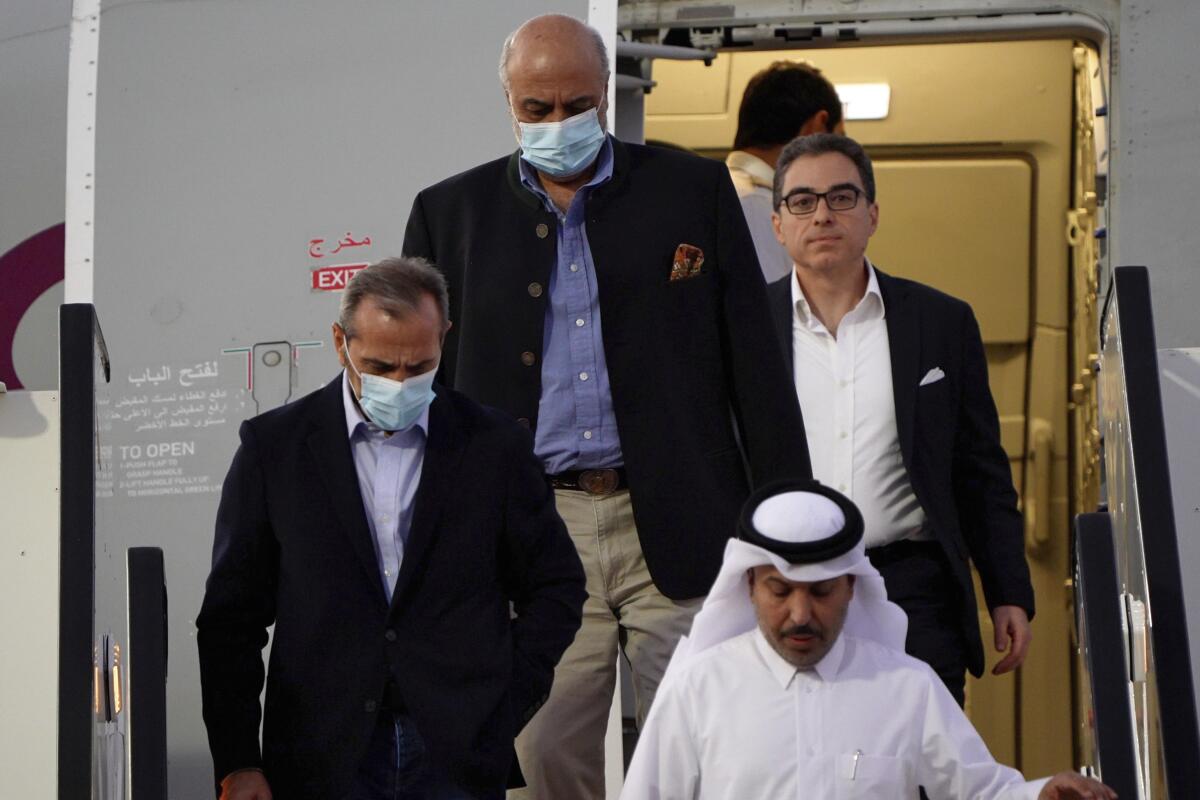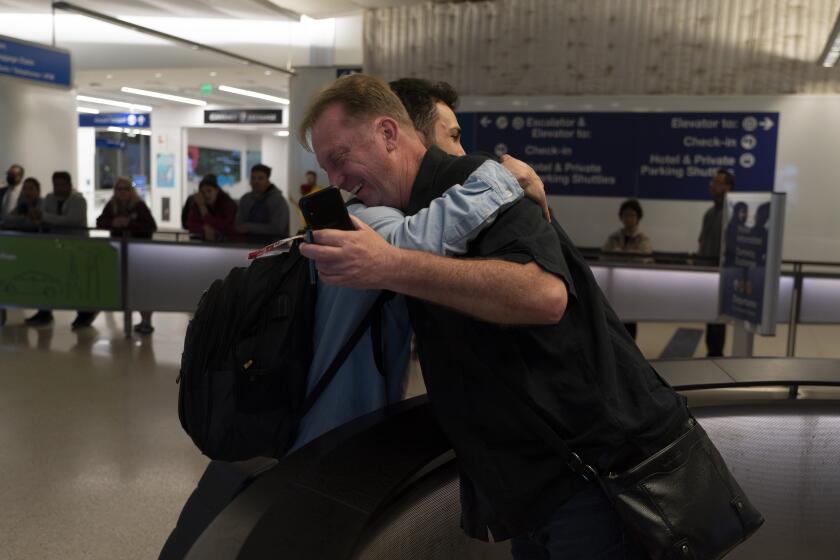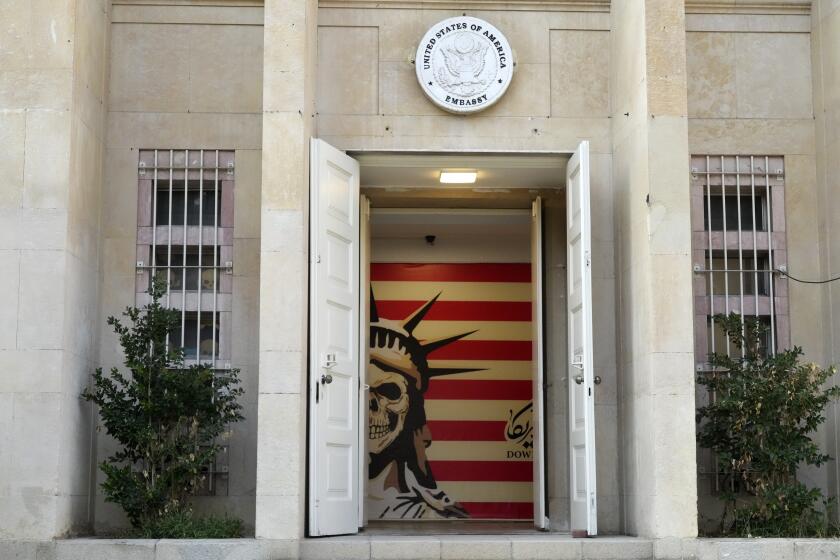5 Americans freed in controversial Iran prisoner swap are back on U.S. soil

NEW YORK — Five American citizens held for years in Iran under what U.S. officials describe as brutal conditions were freed Monday and allowed to fly out of the country, the result of months of secret negotiations, President Biden said.
The former prisoners landed at Fort Belvoir, Va., before dawn Tuesday to cheers and tearful greetings and hugs from loved ones.
In exchange for their freedom, Iran will gain access to $6 billion in Iranian oil revenue that has been frozen, and five Iranian citizens imprisoned in the U.S. will be released.
“Today, five innocent Americans who were imprisoned in Iran are finally coming home,” Biden said in a statement Monday. “Still, too many remain unjustly held in Russia, Venezuela, Syria and elsewhere around the world. We remain unflinching in our efforts to keep faith with them and their families — and we will not stop working until we bring home every American held hostage or wrongfully detained.”
The former prisoners first flew in a Qatari government airplane from Iran to Doha, the Qatari capital, before continuing to the United States.
Deemed wrongfully detained by the U.S., they were moved from the notorious Evin prison in Tehran last month to house arrest as the first step in the complicated deal. Among the five was Siamak Namazi, 51, the longest held at eight years.
“For almost eight years I have been dreaming of this day. Now that it is finally here, I find my ineffable joy of my forthcoming reunification with my family is laced with sorrow — a painful and deep feeling of guilt for taking my breaths in freedom while so many courageous individuals that I love and admire continue languishing behind those walls,” Namazi said in a statement through his lawyer.
“All the political prisoners of Iran, a country where the indomitable courage of women leaves us in awe, deserve their liberty,” he added.
Others who were freed include Emad Shargi, 59, a businessman like Namazi, and Morad Tahbaz, 67, an environmentalist. The two others, at least one of whom is a woman, have declined to be publicly identified. Shargi and Tahbaz were arrested in 2018. Two other U.S. citizens — Namazi’s mother, Effie Namazi, and Tahbaz’s wife, Vita Tahbaz — who had been prevented from leaving Iran were also on the plane.
The three identified men are dual U.S. and Iranian citizens and were imprisoned on what Iran called security-related charges. Namazi’s father, Baquer, was also arrested by Iran in 2016 when he went to visit his son but was released in October on “humanitarian grounds,” Tehran officials said. He is 86 years old and in poor health.
Navy veteran Michael White of San Diego, who was jailed in Iran for years, recently repaid the generosity of a fellow inmate who helped him behind bars.
All of the former prisoners were categorized by the U.S. government as “wrongfully detained,” which means a new division within the State Department worked exclusively on securing their freedom.
On Monday, the U.S. also separately imposed an additional set of sanctions on Iran, targeting its intelligence services and former President Mahmoud Ahmadinejad as punishment for detaining Americans, White House national security spokesman John Kirby said.
He said the move was meant in part to send a message to Iran and show that the Biden administration will remain tough on the Islamic Republic. The release of the prisoners now “is not orchestrated as part of any rapprochement,” Kirby said.
Biden announced the sanctions in his statement and called on the Iranian government to reveal what happened to Bob Levinson, an American and retired FBI agent who went missing in Iran in 2007.
“The Levinson family deserves answers,” Biden said.
The president spoke to the families of the seven American citizens who are returning home from Iran, the White House said in a statement on Monday.
Once the Americans reached house arrest, the U.S. authorized the transfer of $6 billion, frozen as part of economic sanctions against Iran, from a South Korean bank where the money was being held to a “supervised” bank account in Qatar. Iran will be allowed to use the money only for humanitarian needs, U.S. officials said. The transactions will be monitored, and if Tehran uses the money for terrorism or military purposes, the U.S. will re-freeze funds, the officials said.
Of the five Iranian prisoners released from U.S. custody, two will return to Iran, two will remain in the U.S. and one will go to a third country, Kirby said. He did not identify them but said the charges against the two who are staying in the U.S. did not reflect a security threat.
The deal is controversial, especially among Republican critics of the Biden administration, who argue that the arrangement will give the Islamic Republic, as well as other governments, incentive to capture Americans and hold them hostage for ransom.
Some critics have also falsely accused the Biden administration of paying off Iran to secure the freedom of the Americans. In fact, the funds were earned by Iran through oil sales several years ago.
The U.S.-orchestrated coup in 1953 ousted Iranian Prime Minister Mohammad Mossadegh. Its legacy remains contentious and complicated for Iranian authorities and its people.
While advocating for the freedom of the Americans, Rep. Michael McCaul (R-Texas) said he was concerned that facilitating the transfer of the money to Iran, “the world’s top state sponsor of terrorism,” would encourage future hostage-taking.
“The administration is demonstrating weakness that only further endangers Americans and freedom-loving people around the world,” McCaul said in a statement.
Administration officials acknowledge that the deal has involved what they called tough choices.
“When it comes to getting Americans out of jail and back home [who have been] unjustly detained anywhere in the world, I’m happy to take any criticism that comes my way,” Secretary of State Antony J. Blinken said last week. “We are willing to make hard decisions to make that happen.”

On Monday, Blinken warned that “there is no way to guarantee a similar result for other Americans who decide to travel to Iran despite the U.S. government’s longstanding warning against doing so.”
Blinken said he had an “emotional” telephone conversation with the released Americans when they landed in Doha.
“It’s a day I’m grateful for,” he said in New York, adding that families “can hug each other again.”
“We will take steps every day to make this practice [of wrongfully detaining Americans] more difficult, more of a burden,” he said, adding it is an issue he will raise during the U.N. General Assembly meetings this week.
Blinken said the release and negotiations leading to it will have no impact on the broader, fraught U.S.-Iran relationship.
The money transfer has been complex. South Korea insisted it be executed in tranches so as not to affect its own economy. Blinken earlier this month signed waivers to reassure international banks they could handle the money without risk of incurring sanctions or penalties.
Iran’s president, Ebrahim Raisi, has nevertheless raised doubts about how his country will use the money, despite the stated U.S.-imposed restrictions.
“This money belongs to the Iranian people, the Iranian government, so the Islamic Republic of Iran will decide what to do with this money,” Raisi said in an interview with NBC. He spoke through an interpreter.
Negotiations over the prisoners have remained separate from a raft of still-contentious issues between Washington and Tehran, such as Iran supplying Russia with drones used in the war on Ukraine and its support for militant groups throughout the Middle East.
Iran has slowed its enrichment of uranium at nearly weapons-grade levels, a confidential new report by the United Nations’ nuclear watchdog says.
The Biden administration has continued imposing sanctions on Iran and on individual officials, including a batch last week. Many target those considered responsible for human rights abuses, including the death of Mahsa Jina Amini, a young Iranian Kurdish woman who died in the custody of the country’s so-called morality police a year ago. She was arrested for failing to wear her headscarf properly, and her death triggered widespread protests that the Iranian government violently repressed.
“We’ll continue to sanction Iranian behavior, whether it is flouting basic norms of human rights contained in the Universal Declaration [of Human Rights] or ... the work that Iran is doing to provide weapons to Russia to kill Ukrainian civilians, and we’ll have more designations on that in the coming days,” White House national security advisor Jake Sullivan said Friday.
Talks with Iran to curb its nuclear program have been stalled since the Trump administration pulled out of an international agreement that limited Iran’s enrichment of uranium, a key ingredient in nuclear production.
Amid the release of the American citizens from Iran, several others are still being held abroad, including Wall Street Journal reporter Evan Gershkovich, who was arrested in Russia in late March on espionage charges, and Paul Whelan, a former Marine and corporate security executive detained in Russia in 2018, also on spy charges. Both men have denied the allegations.
Breaking News
Get breaking news, investigations, analysis and more signature journalism from the Los Angeles Times in your inbox.
You may occasionally receive promotional content from the Los Angeles Times.
American basketball star Brittney Griner, arrested by Russia in 2022 for possession of vape cartridges containing hash oil, was released late last year in exchange for Viktor Bout, a convicted Russian arms dealer.
Despite the cheer over the release of Iran’s prisoners, critics continued to pummel the Biden administration for making concessions to the country, with which Washington has not had diplomatic relations for decades.
Former vice president and current GOP presidential candidate Mike Pence said the $6 billion amounted to a “ransom.”
But State Department spokesman Matthew Miller said that attitude was unrealistic.
“Iran is not going to release these American citizens out of the goodness of their heart,” he said before Monday’s release. “That is not real life. ... That was never going to happen.”
Wilkinson reported from New York and Subramanian from Washington.
More to Read
Get the L.A. Times Politics newsletter
Deeply reported insights into legislation, politics and policy from Sacramento, Washington and beyond. In your inbox three times per week.
You may occasionally receive promotional content from the Los Angeles Times.















